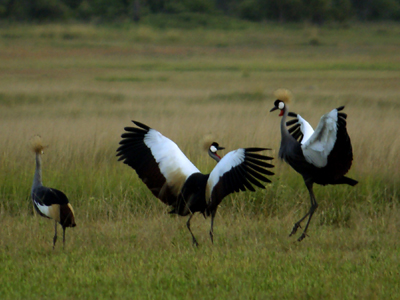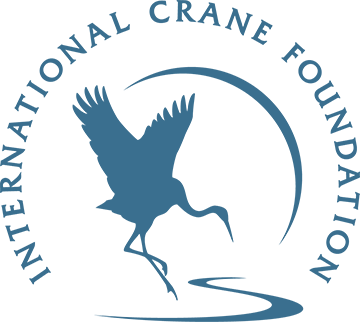 The Endangered Wildlife Trust (EWT) and the International Crane Foundation (ICF), who have been cross-continental partners since 1994, both celebrated 40 years of pioneering conservation action in 2013. The EWT’s African Crane Conservation Programme (EWT-ACCP) and the ICF formalized their working arrangement in 2006, and since then the partnership has gone on to deliver real and positive impacts on the status of cranes and communities across the African continent.
The Endangered Wildlife Trust (EWT) and the International Crane Foundation (ICF), who have been cross-continental partners since 1994, both celebrated 40 years of pioneering conservation action in 2013. The EWT’s African Crane Conservation Programme (EWT-ACCP) and the ICF formalized their working arrangement in 2006, and since then the partnership has gone on to deliver real and positive impacts on the status of cranes and communities across the African continent.
“The aim of the ICF/EWT partnership is to secure cranes and their wetland and catchment ecosystems across sub Saharan Africa, in collaboration with communities and all other stakeholders, for the benefit of cranes and people,” said Kerryn Morrison, Manager of the ICF/EWT Partnership’s ACCP. “We support projects in key crane areas in South Africa, Zimbabwe, Kenya, Uganda, Rwanda, Tanzania, Ethiopia, Zambia and all of these are co-ordinated in collaboration with in-country partners.”
There are four resident crane species in Africa: the Blue Crane Anthropoides paradiseus, Grey Crowned Crane Balearica regulorum, Black Crowned Crane Balearica pavonina, and Wattled Crane Bugeranus carunculatus. The Wattled, Blue and Black Crowned are all listed as Vulnerable and the Grey Crowned Crane as Endangered.
“The ICF/EWT Partnership allows us to draw on expertise from around the world in the development and implementation of strategies to deal with the plight of the birds,” said Rich Beilfuss, President and CEO of ICF. “Research in other parts of the world is available to us through the partnership and can be applied as relevant in Africa. Shared best practices and a global perspective mean that we are able to plan and implement locally and regionally with a higher likelihood of success.”
The ICF/EWT’s focal areas of conservation include:
• Engaging with communities to ensure that the health and condition of wetlands are maintained to sustain ecosystem services for people and cranes and other biodiversity. This work includes alternative and livelihood improvement projects.
• Reducing the impact of the illegal wild caught crane trade on wild populations.
• Reducing the impact that power lines and wind farms have on cranes.
• Research to better understand cranes, the threats to their survival and what they require to thrive and survive.
• Better understanding the role of Blue Cranes on the agricultural landscape in the Western Cape so that objective input into wind farm developments can be provided and the impact of climate change better understood and addressed.
• The development of future conservation leaders and of strong capacity for conservation action on the continent.
For further information about the ICF/EWT African Crane Conservation Programme and how you can help us to secure another 40 years of conservation in action please contact Kerryn at kerrynm@ewt.org.za or kerryn@savingcranes.org. Learn more about how you can contribute to the work of the ICF/EWT partnership.
Contact:
Kerryn Morrison
Manager
African Crane Conservation Programme
Endangered Wildlife Trust
Tel: +27 82 877 5126
Kate Fitzwilliams
Marketing/PR Specialist
International Crane Foundation
Tel: 608-356-9462 ext. 147
and
Nomonde Mxhalisa
Communications Manager
Endangered Wildlife Trust
Tel: +27 11 372 3600
